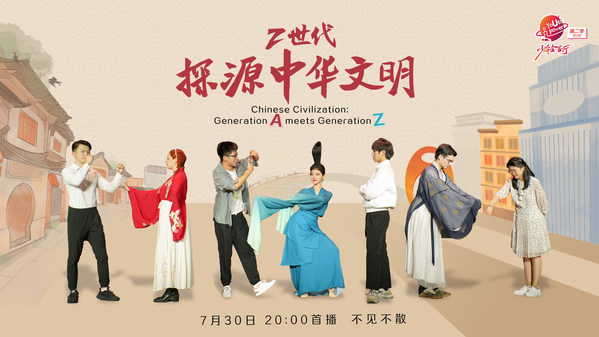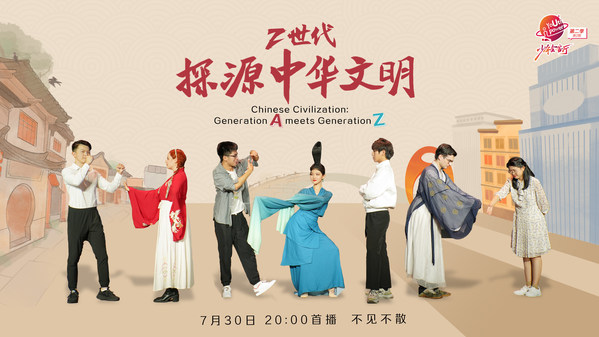BEIJING, July 31, 2022 /PRNewswire/ — To encourage Gen Zers to take a closer look at the history of China and use their wisdom to bring cultural relics to life, the second episode of season two of the China Daily series Youth Power, "Chinese Civilization: Generation A meets Generation Z", was broadcast online on July 30.
In the episode, Gen Zers from China, France and the United States gathered in Henan Museum in Henan province, central China, to explore treasures handed down by generations past, drawing from them lessons for the contemporary world.
"China’s civilization is one of the four greatest civilizations and the only surviving one," said AlexandreGuery, a French Gen Zer who lives in China. "It gave so many technologies to the world, including gunpowder, printing and paper making."
One item in the museum that left him full of wonder was an 8,000-year-old bone flute.
The Gen Zers who gathered in the museum said they believed that in an age of globalization it is important for young people to learn about history and the origins of one’s cultures. They discussed the increasing appreciation of Chinese traditional culture, the pros and cons of turning ancient relics into cultural and creative products, and the reasons for the vitality of Chinese civilization. They also discussed whether cultural relics lost abroad should be returned to China.
"In the 1920s the Tianlongshan Grottoes suffered a large excavation," said Ruan Kexin, a PhD candidate in the School of Archaeology and Museology, Peking University. "More than 240 statues were stolen. Almost all the heads and even the whole bodies of statues were taken away and transported abroad. It was also a very great loss for the cultural heritage of our country."
However, after nearly a century overseas the statues were finally returned to China, he said.
"Allowing more people from other countries to see our cultural relics and feel our culture can help the Chinese culture to go global and strengthen its international influence. Instead of the unregulated movement of artifacts, this can be achieved through the regulated exchange of cultural relics."
Jennifer Courtney Holstein, 26, from the United States, said it was sad that cultural relics are missing from China.
"In the case of the Old Summer Palace in Beijing, a lot of the things were ‘lost’ or stolen or looted. You can’t really imagine what it used to be like, because so much of it was destroyed or taken away."
Zhong Yutong, the episode host, said: "We now know what bad things have happened before and we should do everything we can to ensure they don’t happen again."
He encouraged Gen Zers to express their ideas on breathing new life into historic relics, with the aim of ensuring that these memories become part of present-day thinking.
Through stories, music and dance, Gen Zers breathed life into the relics in Henan Museum, retelling stories of the past. One of the invitees, Wang Licheng, 17, created a song related to the museum’s cultural relics, after he went into various stories and explored the culture.
"I was inspired by the relics themselves and the accompanying information on the walls," Wang said. "I wasn’t sure what everything meant. There were some expressions and characters I couldn’t even understand, so I almost felt as though I wasn’t fully Chinese."
Chen Shihua, a 17 year-old who is about to start her college life at Peking University, performed a dance from the show "Poetic Dance: The Journey of a Legendary Landscape Painting" that reinterprets the renowned artistic work "A Panorama of Mountains and Rivers".
"This performance showcased the aesthetic value and classical beauty of the Song Dynasty," Chen said. "The classical beauty of traditional China has a very important place in today’s world. And its beauty needs to be cherished."
Zhang Yun, a graduate of the Communication University of China in Beijing and the author of the illustrated series "Guardian", talked about the inspiration of her creation, which presents the traditional culture of the Miao nationality in the form of paintings.
"This is a unique form of artistic expression that reflects the spiritual beliefs and philosophies of all ethnic groups in ancient China."
Zhang said she would like to further explore all kinds of traditional culture in China and to present it to young people from all over the world, hoping that through it they can better understand and appreciate Chinese culture.
Youth Power, organized by China Daily, aims to build a global platform for communication and exchange focusing on the interests and ideas of Generation Z. The program comes in the form of interviews, forums and speeches, with topics related to anything of current interest in the world.




